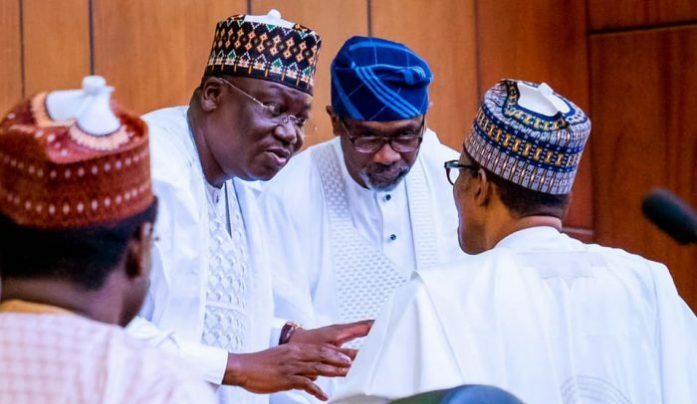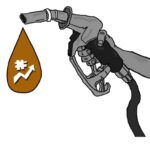When the Shagari administration was faced with dwindling resources in 1981/82, it introduced austerity measures to curb profligacy and eliminate wasteful spending in government.
A New Nigerian editorial suggested that the problem was the president’s inability to manage poverty.
- Call for Masari’s resignation absurd – Media aide
- 2023: Buhari, Tinubu pact not binding on APC members – Kogi governor
The austerity measures could not halt the steady slide of the economy towards the bottom of the pit. The official ban on the importation of champagne did not persuade our crude oil buyers to pay more and swell the national treasury. The poor management of poverty follows the country like the black shadow it is. Sad.
Shagari, of course, took all the blame for the down turn in our national economy. In his speech announcing the president’s overthrow on December 31, 1983, the late Brigadier (as he was then) Sani Abacha said the coup was validated by the fact that the civilian administration had “hopelessly mismanaged the economy.” Not many people disagreed with that assertion although the basis for the claim was tenuous and rested on the assumption propped up by well-oiled military propaganda that our politicians were so uniformly inept that you could not trust them to eat yam pottage without soiling their babban riga.
It was not the first time that the Nigerian economy would put the nation and its people through harrowing wrenches. We first butted our heads against the truth of the lack of wisdom on relying on the volatile crude oil market during the Obasanjo military administration. That government saw that the wind of good times was blowing the nation towards the reef and took immediate steps to prepare the nation to absorb the shock of reduced earnings from crude oil. It imposed cost-cutting measures and stopped the country from wasting foreign exchange on the importation of non-essential goods and luxuries.
When the civilians came in, they relaxed those measures. But by 1981, the economy gave invisible signs that the rosy cheeks sported by the leaders and members of NPN, the ruling party, did not tell full facts about the true state of its health. It was going south once more. The government denied it when the late Chief Obafemi Awolowo read the signs and sounded the alarm. But by 1982, no one could deny that the trouble that was sleeping had been woken up by nyanga. Poverty stared the nation in the face, daring it to blink. Crude oil was fetching less money than we had expected. Shagari imposed austerity measures to save the national economy. They did not quite save the economy; and they did not save his administration. Abacha described the country as “a beggar nation.”
Buhari’s military administration was faced with the challenge of managing our debt burden, if not our growing poverty. Our foreign business and trading partners no longer honoured letters of credit from the Central Bank of Nigeria. Debts piled up; our national economy reeled under it.
Buhari’s first step was to take steps to restore the confidence of the international community in Nigeria as a credit-worthy nation. He introduced counter-trade, a new jazz word for trade by barter; he committed 45% of our earnings to servicing the debts. Nigeria, he believed, must be pulled out of the economic murk into which it was rapidly sinking. Good thinking.
Today, Buhari as president, faces worse challenges on the economic front. Under him, our economy has not enjoyed a robust health. Twice, it has gone through recession. Recession is a nasty challenge for any national economy because it poisons the veins of economic progress. Our economy is pretty much unsteady on its feet. The national treasury provides telling evidence that we are earning less from crude oil and other sources of our national revenue.
No one has accused the president of mismanaging the economy but I suppose it must be clear to him now that the management of the economy is a lot trickier than he imagined all along. The management of the national economy is problematic because it is subject to external forces beyond the control of the managers of the economy. Everything rides on crude oil. Crude oil price is determined by the buyer, not the seller. Thus, every time the buyers develop a bad attitude towards the crude oil market and decide to pay less than the seller’s anticipated price, development and other plans are thrown out of kilter in our oil-producing country. Capital projects are caught up in various stages of execution; salaries are not paid as and when due and the national economy experiences a sudden shrinking pain.
What faced Shagari then, if the New Nigerian was right its editorial, now faces Buhari: the management of our poverty. No man seeking office as president ever promises to manage poverty in his country. Perhaps Buhari does not feel comfortable with admitting that the circumstances of our national economy impose on him the burden of managing our poverty in the face of shrinking financial resources. There is no disputing the fact that our country has steadily witnessed its descent from the top of the mountain as an oil rich nation into the valley as a poor nation.
Our country is now officially a poor nation. The population of the poor exceeds 100 million. If you remember that our estimated national population is 206 million, you would instinctively bite your finger nails. The crown sitting on the head of Nigeria as the poverty capital of the world makes an ugly sight. The challenge is for our country to pass it on to another country worthier of it than we are. To do that, we must institute a creative and innovative approach to meeting the challenges of managing our poverty. A creative and successful management of our poverty should serve as the spring board for the nation’s leap back to good economic health.
Both Obasanjo’s military regime and Shagari responded to that challenge, admittedly in its pristine state, by imposing cost-cutting measures on the country. They were short-term measures to guide the nation through the poverty storm. So far, and mercifully, Buhari has not imposed similar measures. It suggests that the president has gritted his teeth, taking it all in his stride. Except that it is a false suggestion.
Buhari has chosen the easier approach to managing our poverty by readily taking loans from every country willing to be counted among our friends in our dire hours of our economic challenges. Among such do-gooders are China, France, Japan, India and Germany. In addition the country is indebted to its traditional lenders: the World Bank, IMF and AfDB. The Debt Management Office puts the total debt burden on the country as of 2020 at N32.9 trillion. In 2020 alone, it serviced the loans from China with $195.5 million. Other loans are similarly being serviced. We take, we chop and we pay.
This cannot rank as a creative approach to the management of the national economy. I have argued here and elsewhere that no country made it as a debtor-nation or, to borrow from Abacha, as “a beggar nation.” Challenging times such as these are times to look inwards, take hard, painful and unpalatable decisions. The much vilified SAP was a creative response to IMF loans to which were attached unacceptable conditionalities. It was such a calculated decision by the Babangida administration to resist the temptation of taking the impending $2.5 billion bridging loan and force the country to explore alternatives to it. But SAP became a victim of bad politics. Loans do not revive, let alone grow, a national economy. Other people’s money is sweet but there is a not-so-sweet payback time. Always. Inevitably.

 Join Daily Trust WhatsApp Community For Quick Access To News and Happenings Around You.
Join Daily Trust WhatsApp Community For Quick Access To News and Happenings Around You.


